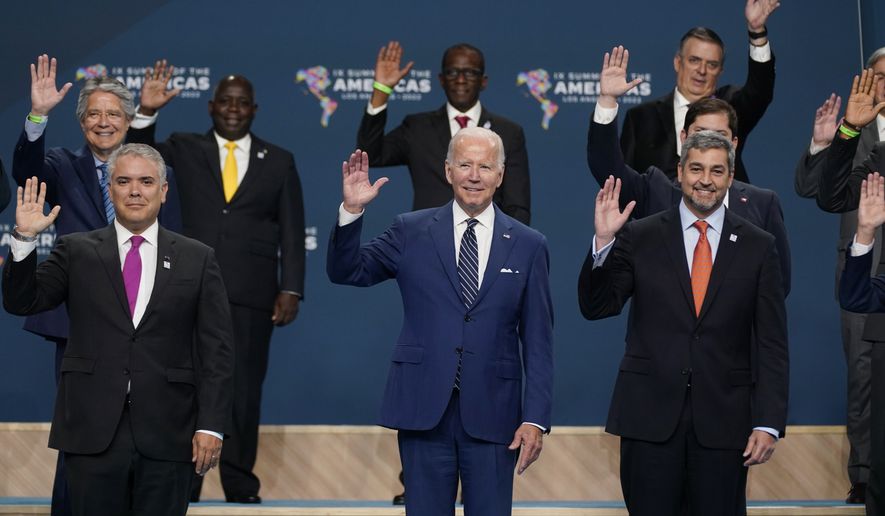LOS ANGELES — Braving bad press and boycotts, President Biden secured an ambitious declaration on migration from fellow hemispheric leaders last week. But that was the easy part.
Getting other countries to live up to the words — and putting teeth behind Mr. Biden’s commitments — will be a much tougher proposition.
The Los Angeles Declaration on Migration and Protection was the chief accomplishment of the Summit of the Americas, which Mr. Biden hosted last week. He agreed to pony up American assistance, open U.S. borders to more guest-workers from the hemisphere and accept more refugees.
Other countries that signed promised to do more to police their borders, granting asylum to some migrants who show up at their doorstep, while ousting those that don’t qualify.
Twenty nations signed on.
“With this declaration, we are transforming our approach to managing migration in the Americas,” Mr. Biden said.
SEE ALSO: Senators break logjam on guns, school safety with bipartisan deal
The agreement suggested a willingness for countries to play host to newcomers, rather than quickly usher them north, many of them en route to the U.S.
Ironically, the Trump administration was building similar deals with key Central American nations but saw that work undone last year by the Biden administration.
Where Mr. Trump used threats of loss of foreign aid or access to American markets to wrangle deals, Mr. Biden is using the carrot approach, with promises of U.S. aid. He says he’s also leading by example, with new programs to welcome and speed asylum-seekers’ cases and to grant special entry to Haitians and Cubans looking to reunite with family already here.
The hope is that other countries will do more to derail the pipeline of migration that has sent an unprecedented number of people up the spine of the Americas and to the U.S.-Mexico boundary.
Immigrant-rights groups cheered the spirit of the deal but wondered if any of the signatories — including Mr. Biden — can live up to their words.
“The tangible commitments by signatory countries today are commendable,” said Julio Rank Wright of the International Rescue Committee. “However, it is unclear how these commitments will be monitored and evaluated. Without long-term funding and political will to protect those displaced throughout the region, the IRC is fearful that the Declaration’s intentions will fall flat and leave millions of people in the Americas behind.”
Other groups said Mr. Biden must push for a more welcoming approach to asylum-seekers, including finally ending the Title 42 pandemic border shutdown that a court has preserved, for the U.S. to show full leadership.
Meanwhile, Rep. Michael McCaul of Texas, the top Republican on the House Foreign Affairs Committee, said he had “little confidence” the agreement would solve the chaos on America’s southern boundary.
“President Biden and Vice President Harris couldn’t even secure the attendance of the leaders of Mexico and northern Central America. Where is all that renewed leadership we were promised by the Biden campaign?” he said.
It’s a question being asked frequently around Washington.
Mr. Biden came into office with more foreign relations experience than any president since George H.W. Bush, having been the top Democrat on the Senate Foreign Relations Committee for more than a decade — including three separate stints as its chair.
His chaotic withdrawal from Afghanistan and struggles to tame North Korea’s ambitions or piece together a new Iran nuclear deal have dented his reputation.
Last week’s summit, his first time playing host to a major international leadership confab, saw more troubles as he barred the heads of Cuba, Nicaragua and Venezuela, which in turn spurred Mexico’s president to boycott. Leaders of Honduras, Guatemala and El Salvador also begged off. Brazil’s President Jair Bolsonaro did show, joining Mr. Biden for an icy bilateral meeting.
“It is not clear to me yet what the summit itself says about the success of the administration’s foreign policy,” said Patrick Duddy, former U.S. Ambassador to Venezuela under Presidents George W. Bush and Barack Obama. “I think there has undeniably, however, been some disappointment that this issue of invitations and boycotts has become so much the dominant theme as people have analyzed the summit.”
Mr. Duddy, who is now director of Duke University’s Center for Latin American and Caribbean Studies, said the more important question is whether Mr. Biden can convince the leaders to make good on the declaration they signed.
“As one of the prime ministers has emphasized, measuring the success of the summit will take place later. What follows the announcements? Will the commitments made in Los Angeles prove to be substantive or recalled two years hence as bromides?” he said.
• Joseph Clark can be reached at jclark@washingtontimes.com.
• Tom Howell Jr. can be reached at thowell@washingtontimes.com.
• Jeff Mordock can be reached at jmordock@washingtontimes.com.




Please read our comment policy before commenting.